- As we have seen, the Go-Back-N protocol
using infinite set of sequence number
can ensure that each frame is received exactly once.
- Frame header that contains the frame and ACK numbers
has finite length
- When a finite set of sequence numbers (for frame and ACK) is used, the "deliver exactly once and in order" reliability guarantee cannot be guaranteed without an additional conditions.
- Consider an example using the following settings:
- Total number of sequence numbers = 4 (2 bit field used in header for sequence number)
- sender window size is 3
- receiver window size is 2
- Consider the following exchange of information:
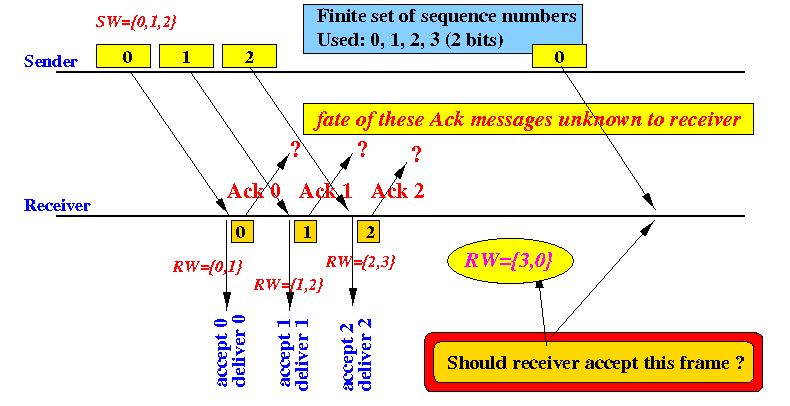
- What should the receiver do with the last frame (the right most frame
with sequence number 0) ?
Clearly, the correct thing to do is:
- If this frame is a
retransmission
of the earlier frame 0, the receiver
must NOT accept
it.
- If this frame is a transmission of a NEW frame (that happens to receive the sequence number 0 because the numbers "rapped around"), the receiver MUST accept it.
- If this frame is a
retransmission
of the earlier frame 0, the receiver
must NOT accept
it.
- What should the receiver do with the last frame (the right most frame
with sequence number 0) ?
- The $64,000 question is then:
- Can we tell for sure if the last frame with sequence number 0 is a retransmission of the earlier frame 0 or a transmission of a NEW frame ???
- The answer to this question is:
NO
Because both outcomes as possible
- The following scenario shows that the
last frame with the sequence number can be a
transmission of a NEW frame
(that happens to receive the sequence number 0 because
the numbers "rapped around"):
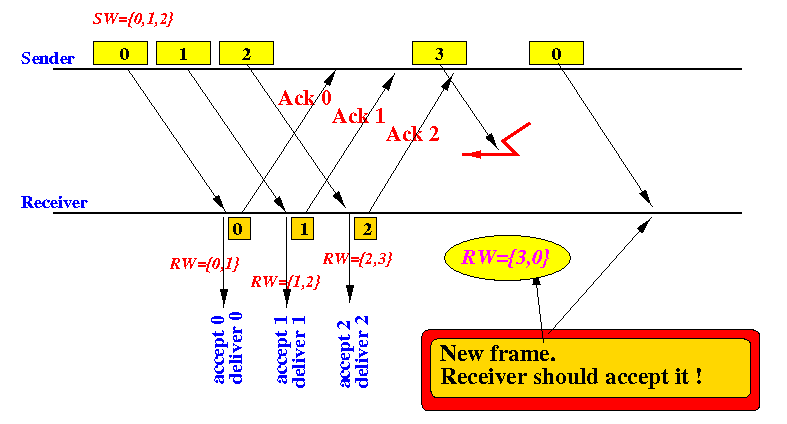
- The following scenario shows that the
last frame with the sequence number can be a
retransmission
of the earlier frame 0:
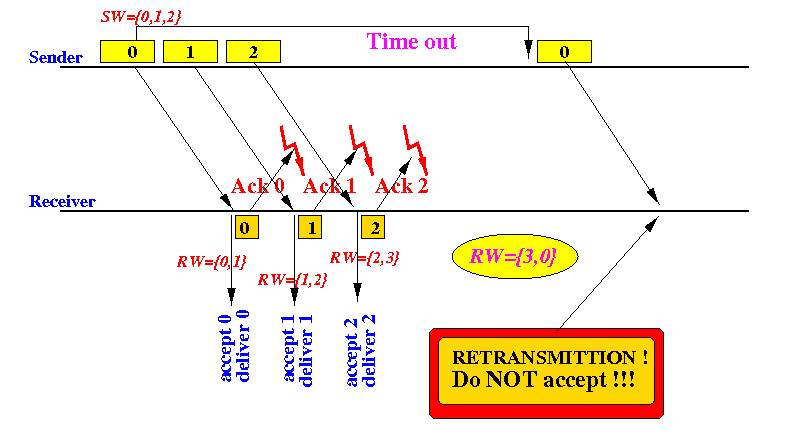
- The following scenario shows that the
last frame with the sequence number can be a
transmission of a NEW frame
(that happens to receive the sequence number 0 because
the numbers "rapped around"):
- Conclusion:
- When finite sequence numbers are used, it is possible for to create a situation where the same sequence number will be used for a retransmission and a new transmission
- Now that we know what is the problem, we are better equipped
to find a solution.
Next we will see that:
The error situations given above cannot arise when:
-
Sender Window Size + Receiver Window Size <= # Sequence number used
- Fact:
-
The sequence number X will exit the receiver's window
before it exits the sender's window.
- Derived Fact:
-
The receiver's window is always ahead of the sender's window.
It is impossible that the sender's window slides ahead of the receiver's window:

From the operation of the sliding window protocol, the receiver's window is always ahead of the sender's window:

(because when the frame X is received, the receiver sends Ack X and immediately slide its window. But the sender window will only slide when the corresponding ACK is received - this will always be later !).
- Consider the worst case
difference in the sender and
receiver windows:
-
In the
worst case scenario,
the
receiver has received every frame transmitted
by the sender and moved its window as far
away as possible.
In the mean time, the sender's window did not move at all - because all Ack messages were lost.
Example:

-
If
in the worst case scenario,
sequence of numbers
has NOT
rapped around yet,
then the receiver will NOT
accept
a retransmission
as
a NEW transmission:
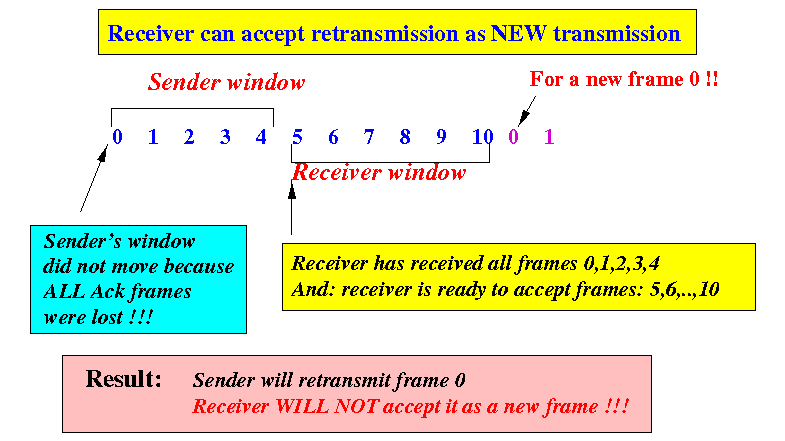
-
On the other hand,
if in the worst case scenario,
sequence of numbers
has
rapped around already,
then the receiver WILL accept
a retransmission
as
a NEW transmission:
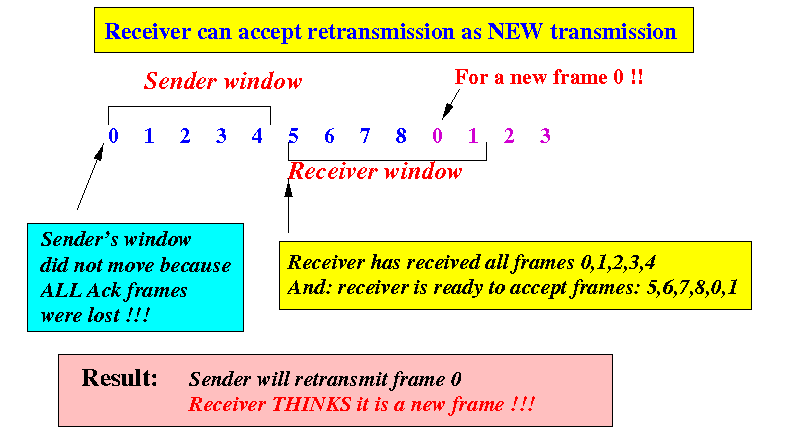
So, to ensure that there is no confusion about whether a frame is a retransmission or a new frame, we must make sure that in this worst case, the sender and receiver windows do not have any sequence number in common (i.e., do not overlap).
If the sender and receiver windows do not ever have any sequence number in common, then the receiver can use this simple way to decide on a received frame:
- A frame with a sequence number within the Receiver window
are new frames
- A frame with a sequence number outside the Receiver window are retransmission.
And there will never be the case where the same sequence number is used for a new frame and a retransmission
- A frame with a sequence number within the Receiver window
are new frames
- Let us apply this result to the above example:
- Sender window size = 3
- Receiver window size = 2
- Worst case senario:

- So according to the discussion above,
if we use 5 sequence numbers (0, 1, 2, 3, 4), there will
be no confusion whether a frame is new or a retransmission.
- The first case of the earlier example of the "confusion example" above is
shown here using sequence numbers (0, 1, 2, 3, 4):
- The number of this frame is now
in the receiver's window !!!
- We see that the receiver can tell that the frame is new
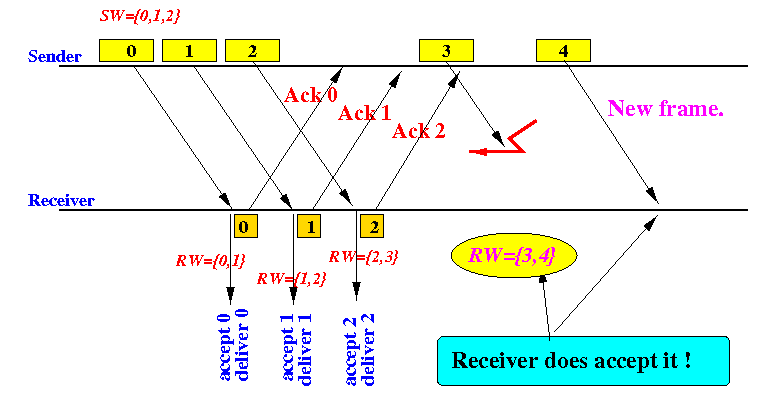
- The number of this frame is now
in the receiver's window !!!
- The second case of the earlier example
of the "confusion example" above is
shown here using sequence numbers (0, 1, 2, 3, 4):
- The number of this frame is
NOT in the receiver's window !!!
- We can see that the receiver can tell that the frame is a retransmission
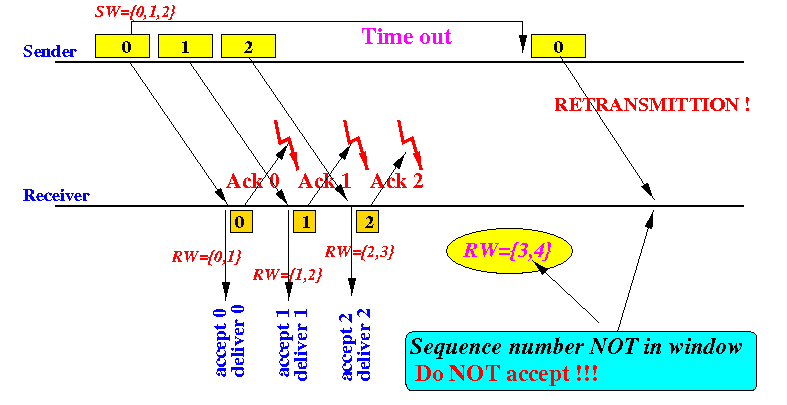
- The number of this frame is
NOT in the receiver's window !!!
- OK, how do you apply this knowledge in practice ?
- Each frame has a field to hold a transmission sequence number
(and a field to hold the sequence number for the ACK !)
- If this field has N bits, then the number of different
sequence numbers available is 2N
- We must make sure that: SWS + RWS <= 2N
- SWS = Sender's Window Size
- RWS = Receiver's Window Size
- Each frame has a field to hold a transmission sequence number
(and a field to hold the sequence number for the ACK !)
- We can specify a tigher relationship if we use some common sense...
Is it practical to use SWS > RWS ?
-
No... because the receiver will not buffer more than RWS frames
(any frames received in excess to the reserved buffer space
will be discarded).
- Therefore:
- RWS <= 2N-1
- SWS <= min(2N-1, RWS), usually: SWS = RWS